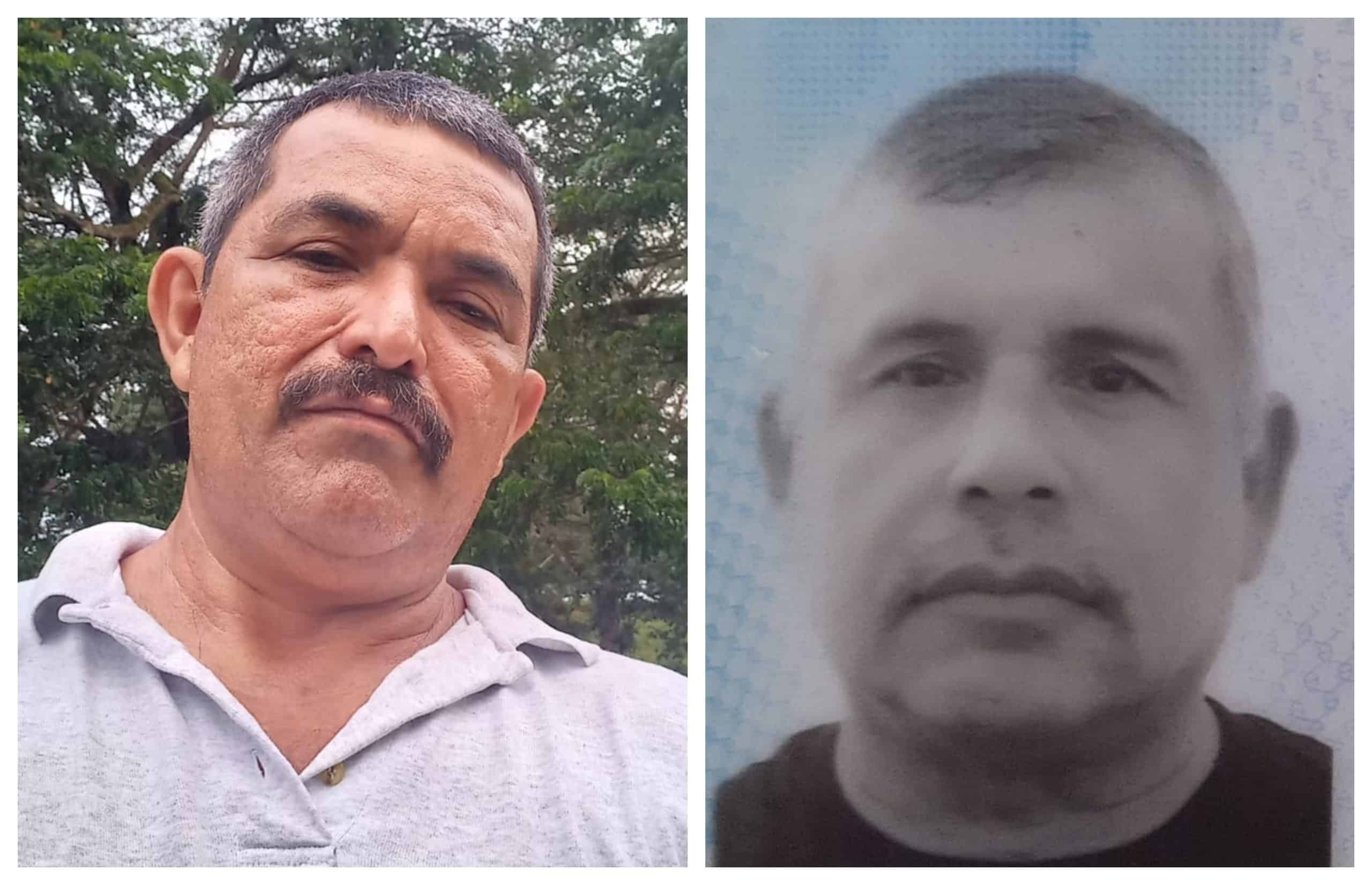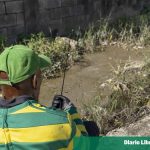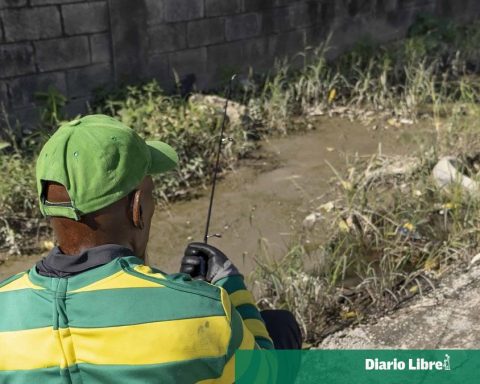On the eve of the general votes, held on November 7, 2021, the Daniel Ortega regime unleashed a hunt against anyone it considered a dissident. The Mechanism for the Recognition of Political Prisoners included in its list of prisoners of conscience six people detained -on November 6, 2021- in the department of Río San Juan. However, the families of these citizens had not publicly denounced their cases, hoping that their relatives would soon be released.
Three months before Armando Robles Alaniz and Esteban Paniagua Espinoza complete a year of being imprisoned, relatives of both political prisoners decided to reveal – in an interview with CONFIDENTIAL– details of the arrests, interrogations, torture and legal process they suffered.
Farmer Armando Robles Alaniz, 50, is originally from Morrito and prior to his arrest on November 6, 2021, he was detained and interrogated twice by the Police of that municipality.
A relative of Robles Alaniz, under the condition of anonymity, explained that the first detentions against the peasant occurred on September 3 and October 5, 2021.
“They persecuted him for having a different opinion, for being a peasant member of the Civic Alliance. Three months before he was sent for arrest, he was being followed by a civilian on a motorcycle; Later, they detained him twice at the police station, they asked him who he was organized with, where he had his weapons, to hand them over and, finally, they forbade him to leave Morrito, they told him that he was completely prohibited from doing so, “he said.
“He was tortured to accept that he had weapons”
Robles Alaniz was arrested when he was on the porch of his home, accompanied by his wife and the youngest of their eight children. A police patrol, with at least seven agents, parked in front of the property, surrounded the entrance and asked him to “accompany them”, without showing any arrest warrant or explaining the reasons for the arrest.
The farmer’s family looked for him at the Morrito police station, but the agents limited themselves to indicating that they had him under a “48-hour investigative process” and that “by orders from above” they could not give more information.
Robles Alaniz was from November 6 to 12, 2021 in the cells of the Morrito police station. At that time, he did not have any visitors and was interrogated and beaten every day.
“The six days they had him they beat him; they hit him with the butt of their rifles on the head, they hit him in the ribs, in the back, from all sides. They beat him because they wanted him to accept that he had weapons and he was not going to do it because he does not have them, he has never used them, “said the relative.
He added that, on November 12, before he was transferred to the San Carlos police station, the departmental capital of Río San Juan, Robles Alaniz was taken by police officers to the Morrito health center, since as a result of the beatings he raised your blood pressure.
In San Carlos, the family member recalled, the beatings stopped, but he denounced that the interrogations and torture continued, because they took him out all day for “interview”, they did not feed him until night and left him for a whole week, day and night, handcuffed.
Convicted of cybercrimes without having social networks
On February 15, 2022, Armando Robles Alaniz was accused -along with citizen Dominga de la Cruz Morales Jiménez, also arrested on November 6 in Morrito- of allegedly committing the crimes of “conspiracy to undermine national integrity and spread of false news through new information technologies”.
Judge Lester Efraín García Morales admitted the accusation against both citizens and denied them the right to have trusted defenders, assigning them a public defender.
The accusation states that both planned “a social uprising in order to provoke violence and alarm”, planning to burn a polling station at the Delfina Quezada de Morrito school. In addition, it points out that they use social networks to spread and share alleged false news.
The relative of Robles Alaniz denounces that the judicial process was riddled with arbitrariness and illegalities. He assures that the arrest date was falsified, his relative was tried with someone with whom he had no contact or friendship, and only the testimony of five police officers was used as witness evidence.
“They led their people to tell lies, they were all policemen. They accused him of meeting with that woman (Dominga), of conspiring, of allegedly wanting to burn down a school on election day, when he did not even know or be friends with that woman. Also, they said that he used those mentioned social networks and he doesn’t know how to use that, he used a chiclerito cell phone, one of those used to call, with keys. When they arrested him they saw that cell phone and returned it, and they also say that he uploaded false news from the Government on November 8 and he had already been in prison since the 6, so everything they said was pure lies,” the relative denounced.
Without material evidence of the alleged conspiracy or the alleged dissemination of false news, Judge José Ramón Guillén Marín of San Carlos declared, on March 29, 2022, Robles Alaniz and Morales Jiménez guilty of both crimes.
On April 4, 2022, political prisoner Robles Alaniz was sentenced to ten years in prison and a fine of 56,461 cordobas. Two days later, he was transferred to the Cuisalá Penitentiary System, in Juigalpa, Chontales.
In the Prison, although the interrogations ceased, the prisoner of conscience remains in a punishment cell, crowded together with nine other common prisoners, and does not receive visits with the same frequency as other prisoners, since they are scheduled every 40 or 45 days.
Political prisoner has lost more than 40 pounds in weight
The relative points out that Robles Alaniz has suffered serious damage to his health in these nine months of confinement, presenting blood pressure problems, permanent pain in his back and ribs, and a loss of more than 40 pounds in weight.
Faced with this situation, he urged “immediate freedom”, because, he stressed, “everything was a setup, a lie, he is innocent and they condemn him only because he thinks differently, because he never did anything wrong, he dedicated himself to his land, to the grocery store that he has with his wife at home”.
He stressed that, although several of his relatives still do not want to report, keeping the hope that this will help to speedy freedom, he decided to “raise his voice because there are no signs that this silence is actually helping to have a speedy freedom.”
Other relatives of political prisoners, detained on November 6, 2021, in Río San Juan, have not publicly denounced their cases either. The Recognition Mechanism includes among those detained on that date: Isacc Isaías Martínez Rivas, 37 years old, from San Carlos, and three citizens identified only with the initials of their names: MJDC, 56 years old, from Morrito; MMRA, 31, from El Almendro; OGLH, 40 years old, from San Miguelito. Also, it mentions three other arrests, registered in November 2021 in that department, only with the description of “anonymous persons”.
The arrest of the former treasurer of CxL
Esteban Espinoza Paniagua was also arrested on November 6, 2021, when he was at his home. More than 15 police officers, aboard two vans, arrived and entered the property and, without presenting any type of arrest warrant or reasons for the arrest, they transferred him to the police station in San Carlos, Río San Juan.
A relative of Paniagua, who is now in exile due to persecution and threats from the regime, affirmed that the citizen was imprisoned for “thinking differently” and being a member of the Citizens for Freedom (CxL) party, a political group to which the Supreme Electoral Council (CSE), led by the Ortega-Murillo regime, sent cancel its legal status in August 2021.
He explained that the family had not denounced the case publicly, through the media, because they hoped that he would be released.
“We did not believe that this whole process was going to take so long, because the townspeople themselves said that it was going to come out. However, the reality was presenting itself differently, four months passed and nothing, they prosecuted it and nothing, so I made the decision to denounce it, ”he indicated.
Paniagua Espinoza, 62, is a man who lived on the pension he received from Social Security. His family member affirms that although he was a member of an opposition party and had the position of treasurer, “he never had problems with anyone, he even got along and talked with Sandinista people, and everyone was surprised when they took him away.”
He explained that, after the capture, the Police only informed them that Paniagua was “under investigation” and they kept him incommunicado for two months.
“They allowed him to visit until December 24. The family spent almost two months without seeing him, ”he denounced.
Paniagua Espinoza was accused, on February 17, 2022, more than two months after being arrested, of allegedly committing the crimes of “undermining national integrity and spreading false news.”
“Absurd” evidence against Paniagua Espinoza
During the process, the police authorities – the relative denounces – “manipulated the date of arrest, placing it close to the date of the beginning of the trial” and They presented “absurd” evidence, such as screenshots of alleged Facebook posts, and testimonies only from police officers.
“They presented absurd evidence, some Facebook posts that don’t appear because he didn’t make them, he had his Facebook account but he hardly used it, he didn’t post,” he stressed.
Judge José Ramón Guillén found Paniagua Espinoza guilty and sentenced him, on April 1, 2022, to ten years in prison, five for each crime, and to pay a fine of 56,461 cordobas, despite the fact that during the process “they failed to prove any of the crimes.
The relative denounced that the political prisoner was beaten twice, when he was transferred to the trial hearings, and suffered constant interrogations in which they asked him “for whom he worked, for what organization, and what orders they gave him.”
On April 6, Paniagua Espinoza was transferred to the cells of the Cuisalá Penitentiary System, in Juigalpa, Chontales. In that prison he remains in a punishment cell and only has visits every 45 days.
The political prisoner, due to the prison conditions he has had to suffer, has developed blood pressure problems, has symptoms of possible heart problems, and has “lost quite a bit of weight.”
“We ask that they give him the benefit of family life. He is an old man, he has health problems, he is already 62 years old and it is not for him to be living that confinement. He is innocent and if they are not going to let him completely free, at least we ask that they send him to his house, that they change his measure, ”urged Paniagua’s relative.
Daniel Ortega’s regime keeps more than 190 people detained in the different prisons of the country. Between November 1 and 7, 2021, prior to and during the general elections, Urnas Abiertas recorded that the Ortega regime detained more than 30 people.















